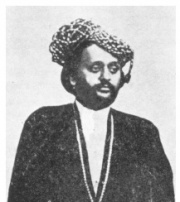Harisinghji Rupsinghji

Prince Rawal Shree Harisinghji Rupsinghji (1861-1903) of the ruling family of Bhavnagar was a friend and supporter of the Founders in the early days of the Theosophical Society in India. He became a member of the T.S. around June 1882, when the Founders were visiting his cousin, Daji Raja Chandra Singhji, Thakur of Wadhwan. The Prince was probably a Chela of the Masters of Wisdom, and supported their existence publicly. In the supplement The Theosophist of June 1884 he wrote a brief article entitled "Phenomenal" where he reported how he received one letter from Master K.H. and witnessed a phenomena during the last December. Later, on September 9, 1884, he wrote another report:
I was at headquarters very often during my sojourn with my friend H. H., the Thakore Sahib of Wadhwan at Madras, whither we had gone last March for the celebration of his marriage with the daughter of the Hon. Gujpati Row. One day I asked Mr. D. M. Mavalankar to let me put a letter from me to my revered Master K. H. in the Shrine. It was in a closed envelope and was regarding private personal matters, which I need not lay before the public. Mr. Damodar allowed me to put the letter in the Shrine. The day after I visited again the Shrine in company with my wife. On opening the Shrine I did find my letter unopened, but addressed to me in blue pencil, while my original superscription: “My Revered Master” had a pencil line running through it. This was in the presence of Mr. Mavalankar, Dr. Hartmann and others. The envelope was intact. I opened it, and on the unused portion of my note was an answer from my Master K. H. in his, to me, familiar handwriting. I should very much like to know how others will explain this, when as a fact both Founders were thousands of miles away.[1]
The letter from K. H was published as Letter 25 in Letters from the Masters of the Wisdom First Series. It consisted of a simple sentence of reassurance: "From one who will ever watch over and protect him if he goes on in the path of duty to his country and righteousness to his Brethren."
The Prince learned a healing technique that allowed him to effect some cures. He wrote an article in connection with this in The Theosophist (December 1881, p. 60) entitled "The Five-pointed star". C. W. Leadbeater witnessed him to use this method:
I have seen Prince Harisinghji Rupsinghji, of Kathiawar, cure instantaneously a man suffering from the sting of a scorpion. The man was already pallid and half-fainting from fright, writhing and groaning in acute pain, and scarcely able to drag himself along with the assistance of two friends; the Prince made over the wound the sign of the five-pointed star, spoke sharply one Sanskrit word, and in a moment the victim, who had sunk to the ground, staggered to his feet, declaring himself well and entirely free from pain, and then proceeded to prostrate himself before the Prince in gratitude.[2]
The Prince was a staunch Theosophist to the end, and donated in the name of his wife the second "Trilithon" that is West of the Headquarters Hall at Adyar.
Additional resources
- https://www.theosophy.world/encyclopedia/harishinghji-rupsinghji Harishinghji, Rupsinghji] in Theosophy World
- Appendix XXV to the First SPR Report on HPB at Blavatsky Archives
Notes
- ↑ See First S.P.R. Report on H.P.B., Appendix XXV at Blavatsky Study Center.
- ↑ Charles Webster Leadbeater, The Masters and the Path, (Adyar, Madras: The Theosophical Press, 1992), ???.